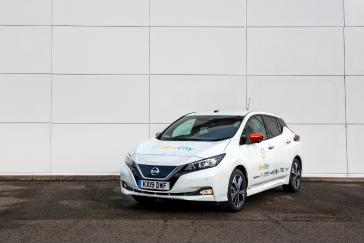· Collaborating with five partners, Nissan is to develop a blueprint and business model
· ServCity aims at deploying cutting-edge autonomous vehicle technology in complex built-up environments.
London (UK) – ServCity, the UK's newest autonomous mobility service research project, has launched this month to help cities solve how they can harness the latest autonomous vehicle technologies and successfully incorporate them into a complex urban environment. ServCity is jointly funded by government and industry, the government's £100m Intelligent Mobility fund is administered by the Centre for Connected and Autonomous Vehicles (CCAV) and delivered by the UK's innovation agency, Innovate UK. Over 30 months, five partners – Nissan, the Connected Places Catapult, TRL, Hitachi, the University of Nottingham and SBD Automotive – will work together to develop a blueprint that directly tackles the barriers to deploying autonomous vehicles in the UK's cities.
ServCity leverages the experience and expertise acquired though the HumanDrive project. Completed in February this year, this project tackled autonomous driving on country-side and motorway lanes, overcoming challenges such as roundabout and high speed country lanes with no marking, white lines, or kerbs. Completed with a 100% electric Nissan LEAF, it was finalised with Grand Drive, the UK longest and most complex autonomous drive from Cranfield to Sunderland. Data and learning gathered during HumanDrive represents a tremendous help in the completion of the new venture.
Through a combination of test simulation, end-user experience research and real-world trials, ServCity will inform how cities can exploit the potential of future mobility solutions and accelerate their deployment. Concentrating on the three key areas of technology, people and scalability, ServCity aims to ensure the user experience is as intuitive, inclusive and "engaging" as possible.
Business and Industry Minister Nadhim Zahawi said: "If society is to enjoy the benefits of self-driving vehicles, we need to ensure the technology can safely master a complex and lively modern city, with all its obstacles.
This project, backed by Government funding, will not only help make autonomous vehicles more user friendly, but also give users confidence that they can respond quickly and safely and to all types of challenges they face on the roads."
Bob Bateman (Project Manager) from Nissan explains: "We are extremely proud to be a part of the ServCity project and are excited to trial our 100% electric Nissan LEAF as test vehicles. Our Nissan Intelligent Mobility strategy strives to achieve a mobility future that is more electric, more autonomous and more connected and we look forward to working in collaboration with ServCity's other partners to achieve this."
About ServCity
ServCity is taking an integrated approach to solving the numerous challenges around implementing autonomous vehicles in our cities. Deploying these new mobility services cannot work if they are introduced in silos. There are too many dependencies and factors outside of service providers' field of vision to work independently.
That's why autonomous mobility services need to be looked at in a joined-up way.
Our aim is to create a blueprint – a set of insights and guidelines – for how autonomous mobility services can become an everyday experience in our cities, for everyone. Our research findings will help provide practical guidance for policymakers, budget holders, transport providers, technology providers – and anyone with a role to play in future mobility.
www.servcity.co.uk







